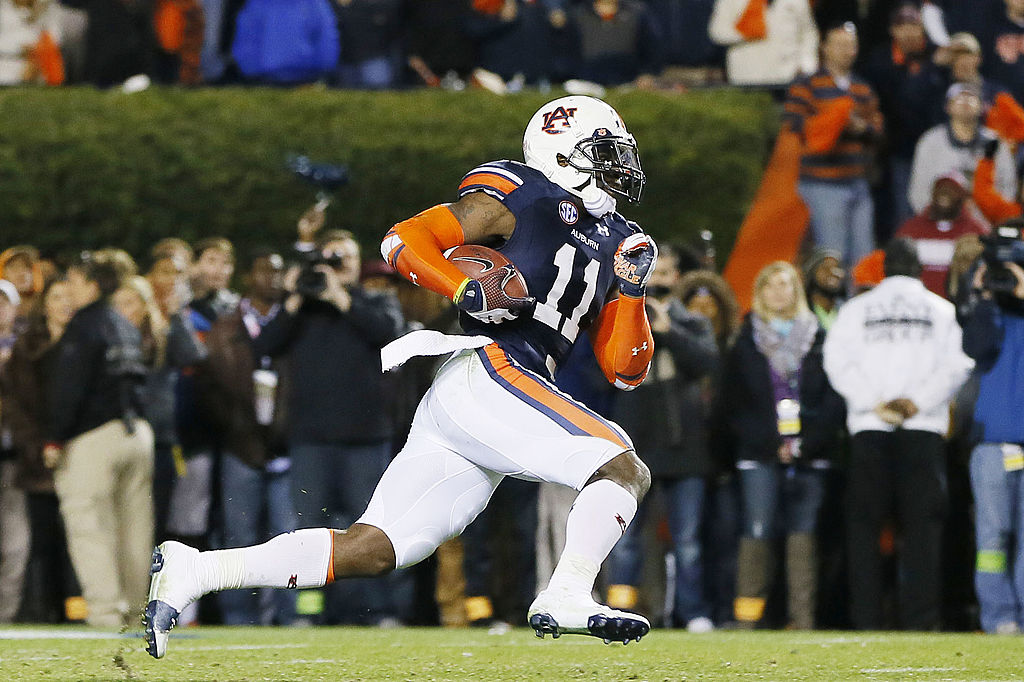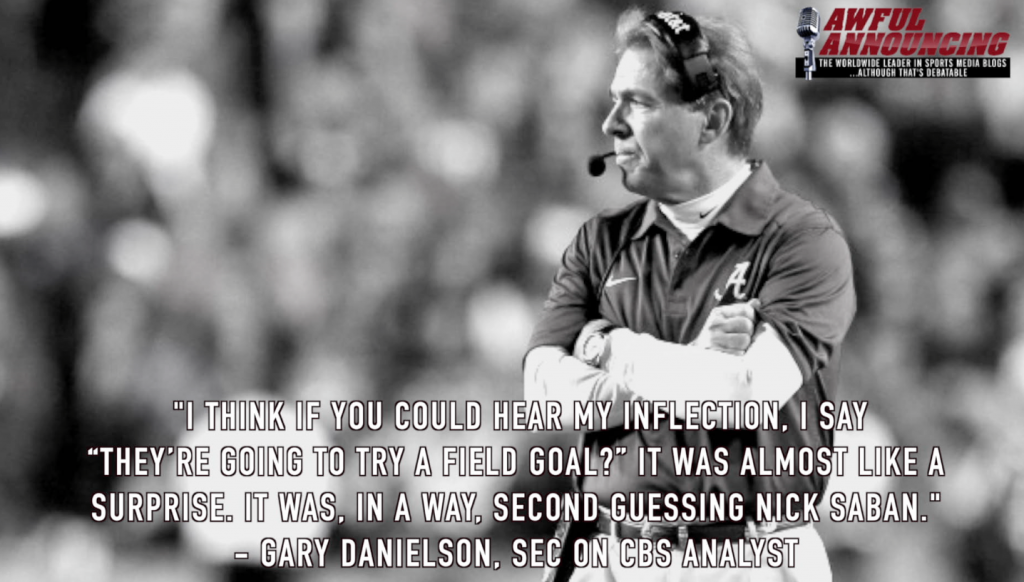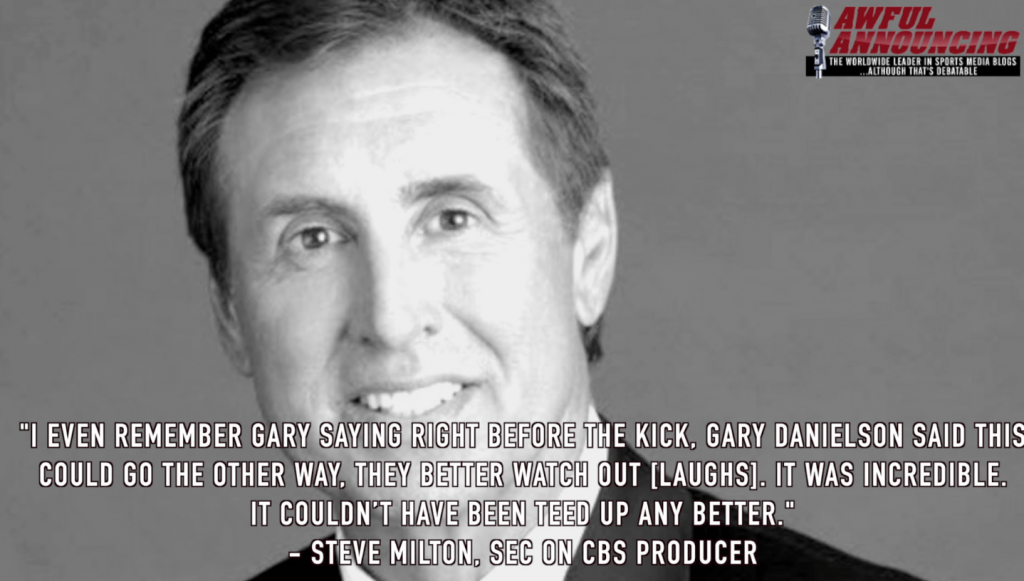PART TWO: THE DECISION
PART ONE: The Leadup
PART TWO: The Decision
PART THREE: The Kick
PART FOUR: The Aftermath
PART FIVE: The Legacy
As the CBS broadcast prepares for Alabama’s Hail Mary with one second left, Danielson alludes to the miracle Hail Mary from two weeks prior. “If anyone learned the lesson of knocking it down, it should be the Auburn backs.”
Danielson— What we try to do as broadcasters is to always try to put recent history into what’s happening right in front of you. You try to connect the dots.
The least risky play is a Hail Mary. I thought a field goal, in my mind, is riskier. My thought was, it was risky because of a block. That there was only one way Auburn could win was with a block, similar to Penn State beating Ohio State. And I’d seen it before. Alabama had.
Lundquist— But to our surprise, they lined up to try a 57-yard field goal.
Milton— So now that takes the other end of the end zone out of play. We know they’re going to send in the kicker now instead of the Hail Mary, we know it’s going to be a field goal.
Danielson— For me it was all about mechanics, past history and decisions that were being made while it was happening.
I’m pretty sure 57 yards didn’t seem realistic in my mind. I probably was wrong about that; he probably could have made the kick if he hit it just perfect, but I thought for sure it was too risky to go field goal.
Milton— I remember him [Gary] questioning saying, they’re going to kick a field goal?
Danielson— I think if you could hear my inflection, I say “they’re going to try a field goal?” It was almost like a surprise. It was, in a way, second guessing Nick Saban.
I did not like it at all. It was subtle. I’m not taking credit for it, but I was reacting to what I was seeing. I don’t really have a plan at this point. I would’ve argued against it if I was the assistant coach or the quarterback. I would’ve said no, let’s throw it, it’s safer.
Lundquist— Saban was irritated, if not angry, at his senior field goal kicker Cade Foster, who had missed three of four.
Silver— Then they trot out the kicker. And it’s not their normal kicker.
Milton— They sent in this redshirt freshman kicker [instead]. It even adds to the drama a little more, they send this redshirt freshman with all this on the line.
Silver— It’s Adam Griffith, and we barely know anything about him.
Lundquist— And so, to our surprise, he sent out Adam Griffith, who was a redshirt freshman, a young man who had been adopted out of his native Poland by a family in Calhoun, Georgia. And he had tried, I think I’m right here, two field goals earlier that year, his redshirt freshman season.
Danielson– At that point, it was all very mechanical. Making sure who the referee was, finding out what yard line it was, my spotter was adding up seven yards back how far the kick was, making sure what was the longest kick in his career.
We do see that Chris White is back there [as a returner]. We can’t really show it. Things are kind of happening fast now, and Verne has control of the plane. And he’s trying to set it up and lay it out and give the suspense that’s needed.
Wolfson— For me, the biggest memory, to be honest, is standing on the sideline, getting ready for an interview with Alabama. They’re going to kick that field goal and I’m down there, and I remember being next to Nick Saban and the whole team and the PR staff and basically getting into position.
Silver— And we get him lined up and ready to go, and they freeze him.
Milton— Auburn called a timeout. So it’s a director’s dream when you could stay live for so long. Build up the drama, show the angst fans praying, the Alabama team on the bench holding hands. And so we would tell the story, essentially, without having to hurry up. So by the time they kicked, we thought we did a good job of setting the table.
Danielson— If you jump in too much, it just doesn’t sound right, so you’ve gotta let Verne now set up the play, and the director give the suspense of natural sound and everything like that.
Wolfson— I was very close to A.J. [McCarron]. One of Alabama’s assistant SIDs came to me and said “you’re going to get A.J., right?” and I go “yeah, but it’s not over yet.”
Milton— All directors will have, what we say, a game winning situation, usually it’s a field goal or a Hail Mary. In this case it’s a field goal.
So with our equipment and the amount of equipment that we have, we disperse that. There will be a camera isolated on the near side bench, there will be a camera isolated on the far side bench, there will be a camera isolated on a block, there will be a camera isolated on the kicker and the holder and there’s a camera focused on the return guy and a camera that’s gonna get the ball through the goalposts. So you have a limited amount of equipment, but everything has to be dispersed.
Lundquist— The defensive coordinator for Auburn [Ellis Johnson] during that timeout, he had another guy under the goalpost. And I think he told us that Chris Davis had a little more speed. He made the replacement. He put Chris Davis back there.
As the timeout was ending, Danielson mentioned that “a blocked kick could go the other way.”
Danielson— I did not say “or a return.” I wish I could’ve, but there was no time. In the timeout, they had changed returners, and I was trying to get a wide shot. But it was too late. It was nobody’s fault. It was just too much drama to set it up at that point. Verne had control of the airplane at that point.
Milton— I even remember Gary saying right before the kick, Gary Danielson said this could go the other way, they better watch out [laughs]. It was incredible. It couldn’t have been teed up any better.
Danielson— I had thought about the fact that I had done the SEC Championship Game [in 2012] where Alabama was controlling the game and Georgia blocked a field goal on a long kick and returned it for a touchdown.
Wolfson— And so I was waiting there, of course, in position, because that’s my main priority. My priority is, what angle am I taking, where’s my audio guy? Which camera guy is meeting me? We were in position for A.J. [McCarron] if they won.
Danielson— Thinking back, I also think that the last thing Alabama—I can’t prove this, this is just in my mind— the last thing that Alabama told their guys when they went on the field was, when they decided to go field goal, make sure you hang in there because you got a field goal blocked against Georgia. And do not, kind of, follow your rules here. Don’t let up. Hang tough because you can’t give up penetration and you can’t get this blocked.
So I think the Alabama field goal team hung in there maybe a half second longer and really, really didn’t fan out and cover. I don’t think in their deepest thoughts they ever thought about a return for a touchdown. I just don’t think that entered your mind.
Wolfson— I did not even think about being in position for Auburn. It didn’t even cross my mind. Granted, I was thinking that it could go to overtime, but it did not cross my mind that Auburn was going to win. So I was in total position for Alabama.
Danielson– One frustrating part of it is that there’s only so much time to get all this stuff in. Everything’s happening really fast, and you’re trying to give all the possibilities to the viewer of what might still happen.
Verne has his job, Verne is laying out the scene. You don’t want to overtalk it. You want to make sure you’ve got the right guys on the field, who the kicker’s going to be. There’s a lot of stuff going on at the same time. So that’s all playing out while it’s happening in real time. People don’t understand— all of us that do this, are all the little things that are happening on the periphery of what’s happening in the game.
PART ONE: The Leadup
PART TWO: The Decision
PART THREE: The Kick
PART FOUR: The Aftermath
PART FIVE: The Legacy









Comments are closed.